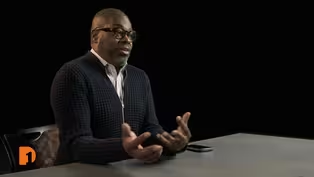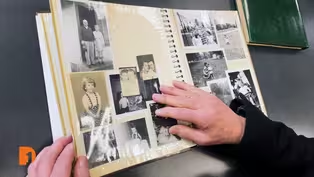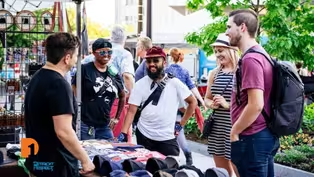
Black women’s influence in the church and community during the Great Migration
Clip: Season 9 Episode 41 | 6m 7sVideo has Closed Captions
Two Detroit ministers discuss women’s impact in the church and community during the Great Migration.
Much is documented about the men who migrated to Detroit during the Great Migration. However, the impact women had during that time is lesser known. One Detroit contributor Stephen Henderson looks at the influence Black women had in the church and community during the Great Migration with Rev. Dr. Constance Simon of Fellowship Chapel and Rev. Paula Lee-Barnes from In His Presence Ministries.
Problems playing video? | Closed Captioning Feedback
Problems playing video? | Closed Captioning Feedback
One Detroit is a local public television program presented by Detroit PBS

Black women’s influence in the church and community during the Great Migration
Clip: Season 9 Episode 41 | 6m 7sVideo has Closed Captions
Much is documented about the men who migrated to Detroit during the Great Migration. However, the impact women had during that time is lesser known. One Detroit contributor Stephen Henderson looks at the influence Black women had in the church and community during the Great Migration with Rev. Dr. Constance Simon of Fellowship Chapel and Rev. Paula Lee-Barnes from In His Presence Ministries.
Problems playing video? | Closed Captioning Feedback
How to Watch One Detroit
One Detroit is available to stream on pbs.org and the free PBS App, available on iPhone, Apple TV, Android TV, Android smartphones, Amazon Fire TV, Amazon Fire Tablet, Roku, Samsung Smart TV, and Vizio.
Providing Support for PBS.org
Learn Moreabout PBS online sponsorship- [Narrator] American Black Journal's "Black Church in Detroit" series examined the role of women in the church and community during the Great Migration.
They organized church groups and provided support for families moving to Detroit from the South.
Host Stephen Henderson spoke with two women pastors about the influence of Black women in the church during this pivotal period.
(upbeat music) - What was the role that women played during this time, and why was it so critical and special, kind of standing out from the role that women played in the church at different times in our history?
- Well, I'll tell my family's story.
I remember my, the story goes, my grandfather was picking cotton, and someone came from the steel industry, and said, "I'll pay you $5 a day."
He dropped the bag and left.
- He said, "I'm going now," right?
(Stephen laughs) - He came right up North, and he sent later, after he started making money, sent later for his wife and his family.
My grandmother, however, the story is about how she built our church in Ohio.
- [Stephen] Wow.
- I'm from Ohio.
She built the church, she did teas, she set up social programs.
She did a lot of things that helped people maneuver.
So as I'm learning and talking with people, I remember my mother-in-law's story about when she came up from Alabama, and she was going to meet her husband who was working up here, and she gets off the train, but she's got open-toed shoes on, and she steps in the snow.
- [Stephen] Oh, wow.
- The translation of the South and the activities and the way people were living, coming North, they had to do some adjusting.
So they did social things, they did feeding programs.
They were, and church was really the hub where everyone could go, where everyone met.
I remember even recently, someone said to me, (laughs) a lady said, "I haven't said this in a long time to anybody."
And I said, "What?"
She said, "Your slip is hanging."
They made sure social things were happening.
(Stephen laughs) They made sure you're adjusted not just in the social world and how to, you know, maneuver.
But they were also dealing with the economics of families.
They dealt with the political institutions.
They actually were the backbone of the church.
And even today, you know, the church still survives because somebody's grandmother or great-grandmother- - [Stephen] Sure.
- Sat in and came up and then said, "Oh no, this is what we must do."
- Yeah.
- They taught Sunday school, you know, whatever the need was.
And when they saw families struggling, they would step in and make sure the family was adjusting.
- Yeah.
- Because the adjustment, just in the weather, the adjustment was huge.
- Well, night and day, right?
- Yeah.
- You know, I also think about the story you were telling about, I think, your grandfather coming up.
He leaves his family behind, because he's gotta go and take work.
- Right.
- Up North.
He's gonna bring them up later.
But that means that your grandmother is left to manage everything in the community that they left behind.
- Right.
- And that's an important and critical role as well.
- Right, but you still had your nucleus, your family.
- [Stephen] People were still there, right?
- The cousins, the uncles.
You know, I think he was the first one to come up to actually explore the territory.
Then after that, others came.
- This was a time of building in cities like Detroit too.
Building churches, building institutions, and the role that women play in that is really critical, Reverend Barnes.
- My story is very similar to Dr. Simon's story, where both my, it started with my grandfather who came first, and then my father came and sent from my mother.
And so one of the very first things that my mother did when she got here was look for a church.
- Oh.
- That was so important to her.
One of the very first things that she did, she looked for a church, and she found a church.
And my mother remained in that church until, you know, she was eulogized in that church.
- Wow.
- The church that she came to and joined when she came to Detroit was the church that she stayed in.
- Which church was that?
- It was True Faith Baptist Church.
They are no longer organized, but that was the church that my mother was laid to rest in.
And it was important for her, because that was her foundation.
That's what she knew, and there was so much that she did in that church.
Just like Dr. Simon said, there were many programs that she helped with.
She was an usher on the usher board.
But they did things to fundraise there.
They did things like cake walks.
I don't know if you familiar with that, pie.
They called them cake walks and pie struts.
(Stephen and Constance laugh) They did those type of things.
And then the very funny thing, which as a child growing up, I thought it was just so funny.
But they had a Mississippi Club.
My mother was from Mississippi, and she discovered that there were so many other people there from Mississippi.
And it was made up of all women.
And there must have been about 20 women that were a part of the Mississippi Club.
And they would meet.
They would go from house to house monthly.
And one day I asked her, "Mom, what do you do in this Mississippi Club?"
She said, "We talk about Mississippi."
- We talk about Mississippi.
Right?
- We talk about Mississippi.
(Constance laughs) We talk about the good times.
We talk about the way things were.
- Yeah.
- And so, yes, it was building.
It was not just building of the church, but building communities, building friendships and fellowships.
It was important for them to be a part of the church, but to also help build a church, and to build communities within the church.
Down South to Detroit: Stephen Henderson shares his family’s Great Migration story
Video has Closed Captions
Clip: S9 Ep41 | 7m 51s | Detroit native Stephen Henderson details his family’s history during The Great Migration. (7m 51s)
From Southern Kentucky to Garden City: Nolan Finley shares his family’s Great Migration story
Video has Closed Captions
Clip: S9 Ep41 | 7m 20s | One Detroit contributor Nolan Finley shares his family’s history during the Great Migration. (7m 20s)
One Detroit Weekend | Things to do around Detroit this weekend: April 11, 2025
Video has Closed Captions
Clip: S9 Ep41 | 2m 3s | Contributors Haley Taylor and Peter Whorf share upcoming events happening around metro Detroit. (2m 3s)
Providing Support for PBS.org
Learn Moreabout PBS online sponsorship
- News and Public Affairs

Top journalists deliver compelling original analysis of the hour's headlines.

- News and Public Affairs

FRONTLINE is investigative journalism that questions, explains and changes our world.












Support for PBS provided by:
One Detroit is a local public television program presented by Detroit PBS


